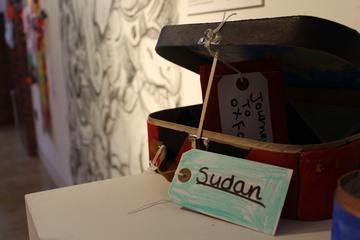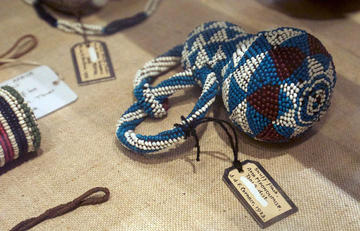Recently awarded Knowledge Exchange Projects
Congratulations to three Knowledge Exchange Projects which have recently been awarded funding to support their activities! See below for more information on each project.

The Museum of Oxford is in the midst of a multi-year HLF-funded redevelopment of their permanent gallery space. This is allowing them to expand the range of Oxford stories they tell; including a new section “Oxford and War”, which will examine how Oxford responded to and was affected by 20th-century wars. The Oxford and War addition poses a challenge for the museum, because none of the artefacts slated to appear in it have ever previously been on permanent display. This means that, unlike for example Oxford’s medieval and Anglo-Saxon history – which both featured heavily in the museum’s former permanent galleries – for Oxford and War the museum has no existing research or label content to draw upon to interpret these objects for visitors, and the museum has no permanent curatorial staff.
Hanna’s role is to conduct research on the people and objects of Oxford’s war stories. She will be both diving deeper into stories the museum has already identified, and also searching out new ones to tell us about Oxford and its war history in different ways. She is a recent DPhil History student, having submitted her thesis on First World War memorials and cemeteries in April 2019.
Thousands of people, locals and tourists alike, visit the Museum of Oxford each year to learn more about this city. Thanks to this Heritage Seed Fund grant, Oxford’s war history – a very important part of its story – has the opportunity to be critically researched and engagingly interpreted to become a fundamental part of the story Oxford tells about itself to the world.

JC Niala is working with the Museum of Oxford on their Journeys to Oxford permanent exhibition as the museum prepares to re-launch in 2020. Journeys to Oxford is an exhibition featuring the lives of people who have moved to Oxford and have left their mark on the city. Using a mixture of traditional display cabinets and listening posts, visitors to the museum will receive a guided experience of the City of Oxford from a diverse and inclusive perspective. The exhibition will bring to the fore the fascinating but often lesser told history of the city. JC is a doctoral student in the Department of Anthropology with a passion for Oxford’s social history. The City of Oxford is her research field site and previous projects include Women in Oxford’s History Podcast series, contributing to the Out in Oxford museums trail and a mini-ethnography of a street in Summertown. The collaboration between JC and the Museum of Oxford is also a means for knowledge exchange with Oxford residents.

The Labelling Matters project explores the often problematic language (textual and pictorial) used within the Pitt Rivers Museum. The labelling within the museum is in itself historic, thus the project is seeking ways to create interventions within the museum that does not erase the history of those labels but uses them to explore the processes, such as colonialism, that uphold hierarchical ideologies and stereotypes. The Pitt Rivers Museum seeks to confront uncomfortable histories and the Labelling Matters project has outlined new and innovative forms of interpretation to subvert traditional narratives of the collections within the museum.
Labelling Matters: Activating Objects is a part of the wider Labelling Matters project, in the form of a partnership with Pitt Rivers Museum, Oxford Spires Academy and Chrome Media to create a series of short broadcast-quality podcasts with students from Oxford Spires Academy interacting with items in the collections of the Pitt Rivers Museum, exploring the use of language and text and the challenges presented in that context by the Museum's colonial origins. The students will work with the museum to refine a pilot framework for recognizing said colonial ideas that appear through the museum's use of language. This will bring new voices and perspectives into the Museum in a popular format and will instead counteract the tipp-exing of history by adding nuanced layers.


